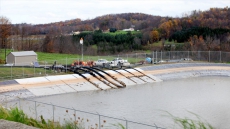OTTAWA — On the day Canada agreed to the controversial Trans-Pacific Partnership, an internal federal analysis warned the deal threatened to water down the country's powerful business position in the crucial U.S. market.
The October briefing note, prepared for then-finance minister Joe Oliver, framed Canada's participation in the 12-country Pacific Rim pact as a defensive manoeuvre, at least in part.
The memo said that arguably the most-important benefit for Canada in the not-yet-ratified deal would be allowing it to "stay in the tent" with the U.S. and Mexico — its partners in the North American Free Trade Agreement.
Joining the TPP would enable Canada to continue its participation in the North American supply chains that "underpin the economy," said the note, obtained by The Canadian Press through the Access to Information Act.
On the positive side, the "secret" document also noted the pact would expand Canadian trade opportunities in Asian countries like Japan, Vietnam and Malaysia and ensure a level playing field with U.S. exporters.
Through the TPP, Canada would also become one of the few countries to have free-trade deals with the U.S., Europe and East Asia, the memo said.
Closer to home, however, the agreement would swing open the doors to the crucial American market, it warned.
"Canadian businesses will also face intensified competition as nine more countries will essentially enter the 'NAFTA tent' and dilute Canada's privileged position in the U.S. market, " said the document, dated Oct. 5 — the day the deal was announced, two weeks before the federal election.
Canada signed the treaty in February, but International Trade Minister Chrystia Freeland described the move at the time as a "technical step" that didn't necessarily signal it was a done deal.
Freeland has vowed that only a vote in Parliament would ratify the agreement, which was negotiated under the former Conservative government.
Supporters of the TPP argue it would open foreign markets and could bring significant benefits for Canadian sectors like forestry, manufacturing and agriculture, especially canola, beef and pork production.
Opponents of the pact have warned it could eliminate Canadian jobs and damage some sectors of the economy. Law experts and business leaders have been deeply critical of the deal's intellectual property provisions.
Last week, Nobel Prize-winning economist Joseph Stiglitz urged Canada to abandon what he described as a "badly flawed" deal.
Stiglitz said in an interview that the TPP could hamper the Liberal government's efforts in two key areas of its agenda: fighting climate change and rebuilding relations with Aboriginal Peoples. The deal, he added, would benefit big business at the expense of working people because it would drive down their bargaining power as well as their wages.
Stiglitz said he personally shared some of his concerns with Freeland in January at the World Economic Forum in Davos, Switzerland.
Regardless of Canada's eventual decision, the future of TPP is in doubt.
U.S. presidential hopefuls from both the Democrats and Republicans have said they would reject the treaty following a groundswell of public opposition to the deal.
However, the current U.S. administration remains committed to the TPP. Last fall, U.S. President Barack Obama spoke with Prime Minister Justin Trudeau about the importance of ratifying the deal.



